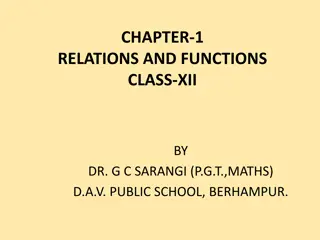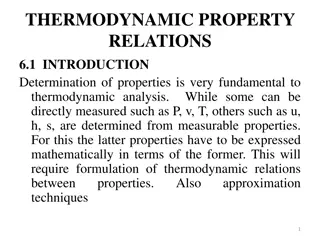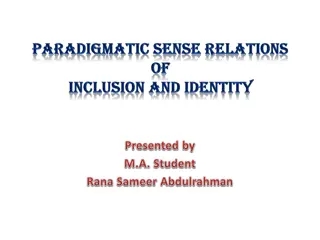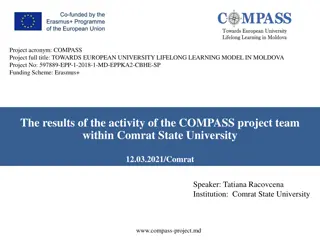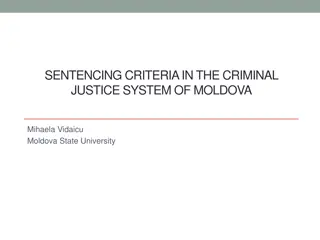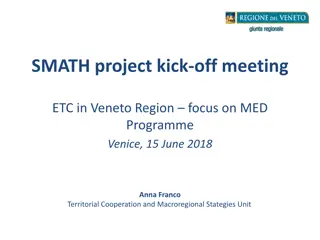Enhancing Civil Society Cooperation in Moldova: A Platform for EU-MD Relations
The Eastern Partnership Civil Society Forum serves as a platform for promoting dialogue and cooperation between civil society organizations (CSOs) in the EU and Moldova. The aim is to strengthen understanding, facilitate participation in decision-making processes, and build institutional capacity. The forum focuses on enhancing involvement in EU-MD relations and supporting the implementation of the Association Agreement/Deep and Comprehensive Free Trade Area.
Uploaded on Oct 11, 2024 | 4 Views
Download Presentation

Please find below an Image/Link to download the presentation.
The content on the website is provided AS IS for your information and personal use only. It may not be sold, licensed, or shared on other websites without obtaining consent from the author.If you encounter any issues during the download, it is possible that the publisher has removed the file from their server.
You are allowed to download the files provided on this website for personal or commercial use, subject to the condition that they are used lawfully. All files are the property of their respective owners.
The content on the website is provided AS IS for your information and personal use only. It may not be sold, licensed, or shared on other websites without obtaining consent from the author.
E N D
Presentation Transcript
Eastern Partnership Civil Society Forum 1 CSO BILATERAL AND MULTILATERAL PLATFORM FOR ASSOCIATION AGREEMENT IN MOLDOVA September 2015
Feedback to previous Qs 2 How GoM and CSO Platform Works ? there is no agreement on regular works and I am not sure all relevant public institutions are aware about our platform or our goals and aims. Thank you to MFA and ME are here and we hope in efficient constructive cooperation. Today is one way cooperation, ad hoc, upon urgent events and when progress reports are needed or adoption of strategic docs shall be approved. It s a tick box V
Feedback to previous Qs 3 How GoM and CSO Platform Works / Communicate? there is no agreement on regular works and I am not sure all relevant institutions are aware about our platform or our goals and aims. Thank you to MFA and ME are here and we hope in efficient constructive cooperation. We should change the approach and just become efficient and set up friendly cooperation. Today is one way cooperation, ad hoc, upon urgent events and when progress reports are needed or adoption of strategic docs shall be approved. It s a tick box V
CIVIL SOCIETY COOPERATION (Ch.26/art.135) 4 Agreement says: Parties shall establish a dialogue on civil society cooperation: to strengthen contacts and exchange of information and experience between all sectors of CS in the EU and MD to ensure a better knowledge and understanding of MD (history, culture, etc) in particular among CSO based in EU MS; to ensure a better knowledge and understanding of the EU in MD.. in particular among CSOs of Moldova, with a non- exclusive focus on the values on EU is founded, its policies and its functioning;
AIMS of dialogue and cooperation 5 to ensure involvement of CS in EU-MD relations, in particular in the implementation of this AA/DCFTA, including its monitoring,; to enhance CS participation in the public decision- making process, particularly by establishing an open, transparent and regular dialogue between the public institutions and representatives of CSO; to facilitate a process of institution-building of CSOs, including: advocacy support, informal and formal networking, mutual visits and workshops in particular in view of improving the legal framework for civil society;
Specific sectors in DCFTA Title 6 IPRs: Art. 332 Cooperation: Parties agree to cooperate with a view to supporting implementation of the commitments and obligations.. and areas of cooperation include: promotion and dissemination of information on IPRs in business circles and CIVIL SOCIETY; public awareness of consumers and right holders;
TRADE AND SUSTAINABLE DEVELOPMENT (art.377) 7 In July, 2015 at 1st meeting of Joint Civil Society Dialog Forum agreed that key policy priorities should focus: 1. Addressing the fundamental weaknesses of MD-EU relations (2015) that led to postponement of EU funds: forming a functional GoM well-committed to DCFTA implementation and speeding up structural reforms; enhancing the transparency of decision making at local and national level; Re-building an effective system of sound regulation and supervisory institutional capacities for the banking system and ensuring macro-economic stability;
TRADE AND SUSTAINABLE DEVELOPMENT - JCSF 8 Consolidating and strengthening the capacities of civil society and the civil society platforms (CSOs, trade unions, employers associations, environment movements, consumers' organizations, chambers of commerce) in order to ensure a qualitative feedback for the GoM on DCFTA implementation and enforce the checks and balances mechanism between the CSO GoM: It includes enhancement of the quality and the benefits of social dialogue, by capacity building, exchange of information, practical experience and good practice, and Interference in activities of trade unions and in general into the activity of the social partners is not acceptable;
TRADE AND SUSTAINABLE DEVELOPMENT - JCSF 9 Addressing Cost and Quality COMPETITIVENESS issue: by easing the access to finances (especially for the small and medium enterprises), stimulating the inflows and absorption of technologies at the company level, and raising knowledge and awareness among the private sector about the DCFTA implementation; Mandatory consultation of the Domestic Advisory Group members [National CS Platform] on the draft laws and regulations elaborated for DCFTA implementation activities;
TRADE AND SUSTAINABLE DEVELOPMENT - JCSF 10 Addressing the issue of the informal economy, by decreasing the costs of formal economic activity and increasing the penalties of informal economic activities Adoption and strengthening of the domestic enforcement of the ILO conventions related to social protection of employees; Removing of NTBs, by speeding up the reform MSTQ, adoption and implementation of EU quality standards, aligning food safety system to EU one, downsizing bureaucracy related to issuing quality certificates, certificates of origin, licenses and other permissive docs, VAT refunds;
TRADE AND SUSTAINABLE DEVELOPMENT - JCSF 11 Aligning Educational system to the real economy needs, by ensuring functioning of sectorial committees for implementation of EU aligned Employment standards; Speeding up reforms aimed at most pressing environmental problems: lack of adequate storage and recycling capacities of waste, insufficiency and poor quality of water, poor quality of air and high vulnerability to environmental shocks; Conducting TSIA of the DCFTArelated to MD challenges, using agreed methodology and indicators. !!! Methodology and indicators shall be approved by GoM, but Assessment Reports shall be conducted by independent entities on an annual basis.
AA/DCFTA Audit Direct Effect on Business 12 Area of Association Agreement Likely Impact on business Sectors potentially affected Money corruption Market access laundering/crime & Requirement financial reporting/controls Market opportunities in EU and cheaper imported inputs Adaption of production and CA. for increased All Depending on current structure of tariffs Manufactures Approximation of TR, standards, and CA and labelling Approximation of SPS Compliance with EU SPS and animal welfare standards Agriculture Agro manufacturing All importers and exporters processing sector of Approximation to EU customs law (customs code) Approximate on public procurement Procedures for customs administration Opportunities to bid on EU contracts Professional services Construction Manufacturers Agriculture Agro processing sector of manufacturing Phasing out of use of certain GIs in Ukraine and third markets Rebranding of products affected by GIs
AA/DCFTA Audit 2 13 Area of Association Agreement Likely Impact on business Sectors potentially affected Approximation relating to energy cooperation Product standards regarding energy and labelling thereof, of products and buildings Manufacturing Construction Real Estate Professional services Agriculture GMO monitoring Use and control of GMOs Road transport Road and vehicle safety Transport Wholesale/retail Manufactures (of dangerous products in particular) All Company law, corp. governance, accounting and auditing Environment Changes in corporate governance Control of industrial pollutions and hazards (vehicle emissions waste and waste water) Safety and health of workers at work,, use of work equipment, personal protective equipment Transport Manufacturing (esp chemicals) Agriculture All sectors Especially construction Manufacturing (esp chemicals) Health and safety
SME Survey Level of Understanding of AA/DCFTA 14 Understanding of market access to the EU market under DCFTA Awareness of AA/DCFTA 37% 17% 21% 34% 21% 8% 78% 72% 33% 79% 30% 43% Ukraine Georgia Moldova Ukraine Georgia Moldova SME's stating that they know where to find info on market access SME's starting they understand the market access opportunities SME's that heard of AA/DCFTA prior to this Questionnaire SME's that think that AA/DCFTA will have an impact on all business in coutry Summary of Findings 1.no understanding of the scale 2.little or no understanding of specific scope and coverage 3.limited resources available for needed changes
After signature (June 2014) of AA/DCFTA CSO National Platform actions: 15 6 000 leaflets about the DCFTA and AA 1,000 brochures about AA/DCFTA 800,000 postal cards about the benefits of the EU Association Agreement 12 posters and 40 000 EU binders 8 editions of the ''European Objective' newspaper in RO and RU (100 000 copies published and distributed intensively broadcasted on TV stations with national coverage door-to-door campaign, Euro-buss in 70 localities of Moldova; Platform supported of the newly created European Informational Centres in Chisinau, Comrat, Balti and Cahul including the Days of European Culture , www.infoeuropa.md - web portal
How to set a Bilateral dialogue 16 Governments and Authorities National Platform Develop and write development and monitoring projects Be involved in setting-up indicators to measure the level of implementation Be involved in discussions of progress reports on level of implementation Strengthening the capacity building of the National Platforms and its members on understanding the DCFTA goals and aims of monitoring process Support and look for funds to finance CSOs projects Set up indicators and outcomes goal for each action of the DCFTA Action Plans Submit its Progress Reports after consultations with CSOs; Express partnership and actively participate in National Platforms activities
Thank You 17 QUESTIONS AND ANSWERS Further Information: gmincu@yahoo.com






